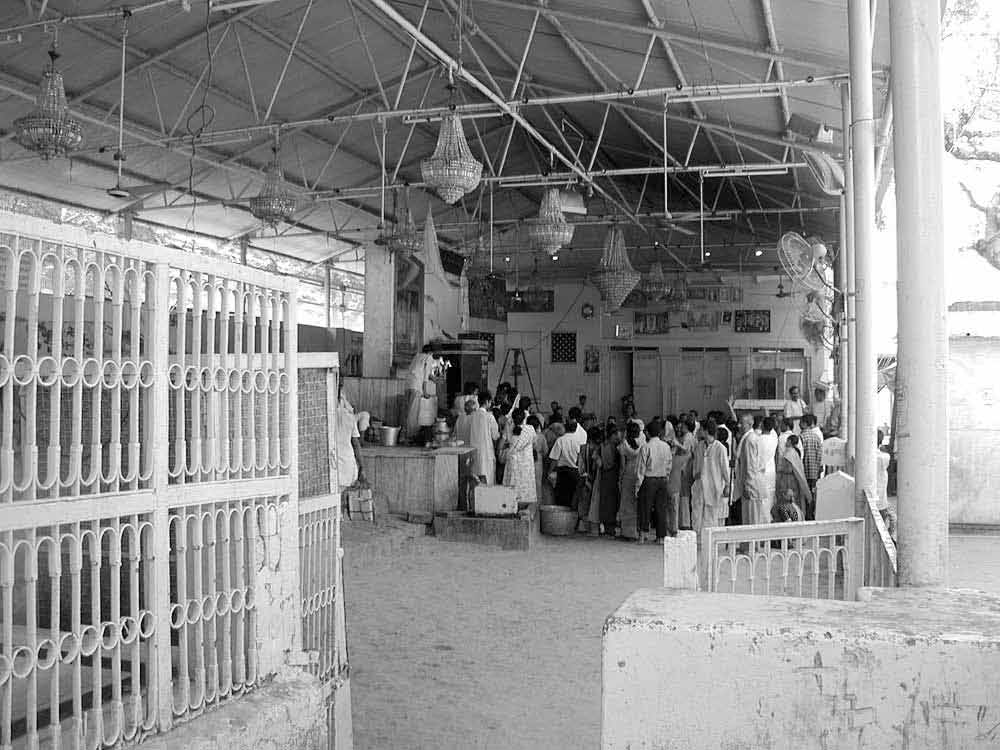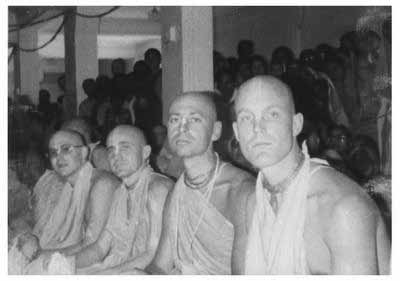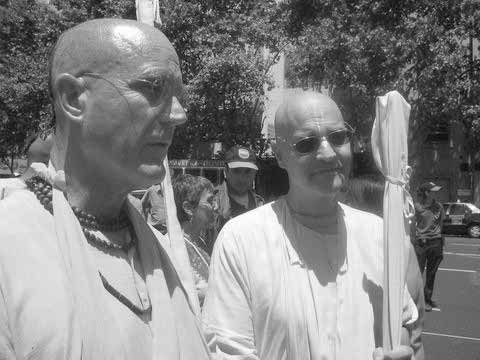By Indradyumna Swami
| November 9 – 15, 2005 |
Before leaving Vrindavan for the West, I told Sri Prahlada das that I wanted to take darsan of the famous Deity of Sri Nathji, in Rajasthan. The Deity was discovered on Govardhan Hill by a great devotee, Madhavendra Puri, more than 500 years ago, before the advent of Lord Caitanya Mahaprabhu. The Deity was later moved from Vrindavan to Nathdwar, not far from the pres- ent town of Udaipur.
“That would be wonderful,” said Sri Prahlada. “At the same time we could visit a famous astrologer a few hours away in the desert. He is known as a Brighu because he reads one’s future from the Brighu Samhita.”
“Can he really predict the future?” I asked.
“Oh yes,” replied Sri Prahlada. “The science of Brighu Samhita is still valid. Srila Prabhupada confirmed this. At the end of Dwapa- ra yuga, Brighu Muni was concerned that in Kali yuga many astrolo- gers would not be qualified, so he wrote down everyone’s chart and included past, present, and future lives.
“Copies of those charts are kept safely in four different places in India. When you visit a Brighu, you see written in your chart that you would come on that very day for a reading.”
“That very day?” I said.
“Not only the day but the hour too,” Sri Prahlada said.
I went to my room and searched through Srila Prabhupada’s books and lectures on the Vedabase, and to my amazement found the following quotation:
How one can understand past, present, future? Through the sastra …There are still astrological calculations in India called Brighu-samhita. If you consult Brighu-samhita, immediately they will give you your past, present and future. Immediately they will give. The astrology science is so perfect. What you were in the past life, what you are at the present and what you are going to be. These three things can be known.
[Srila Prabhupada, Srimad Bhagavatam class, Dallas, July 29, 1975]
That evening I met Sri Prahlada again. “You know,” I said, “I think I’ll take you up on that proposal to visit the Brighu.”
“Really?” said Sri Prahlada.
“Yes,” I said. “I’d be interested to see what opportunities for devotional service lie ahead for us this coming year.”
Two days later, Sri Prahlada, Bimal Prasad das, Dhruva das, and I arrived in Udaipur. After settling in, we took a one-hour taxi ride through rolling hills to the village of Nathdwar, where we visited the temple of Sri Nathji. It was less crowded than when I was there five years ago, and we enjoyed a wonderful darsan.

That afternoon we hired a taxi and drove further into the desert. After four hours we reached an old, dusty village in what seemed like the middle of nowhere.
“How in the world are we going to find the Brighu in this place?” I asked. “There are no street signs, what to speak of house numbers.”
“The local people will know him,” Sri Prahlada replied. He opened the window and asked in Hindi for directions from a pass- ing rickshaw driver.
“The Brighu’s house is two streets down, on the corner,” said Sri Prahlada, as he closed the window.
As we drove on, I saw an old man in a dhoti, standing on a porch, looking in our direction.
“That must be the place,” Sri Prahlada said. “How can you be sure?” I asked.
“Because the Brighu is waiting for us,” he said. “Waiting for us?” I said.
“Yes,” he said. “It’s in our charts that we’ll be arriving this morn- ing.”
A shiver went through my body.
We stopped in front of the house and got out. The old man came forward to greet us.
“You’re right on time,” he said with a smile.
I looked at Sri Prahlada. “Right on time?” I said.
Sri Prahlada winked.
The old man invited us into his small house and brought us into a room lit by a small kerosene lamp. I saw old pictures of saints and sages on the wall, and I asked Sri Prahlada about the most prominent one, a white-bearded sadhu sitting with a large book in his lap.
“Brighu Muni,” Sri Prahlada whispered.
“Please write down your place of birth, the date, and the time,” the old man said to me.
Then he reached into an old wooden box and pulled out some papers. He placed one in front of me.
“Close your eyes,” he said, “and put your index finger on one of the diagrams on the sheet.”
I hesitated for a moment, then closed my eyes and put my finger squarely on the paper. When I opened my eyes, I saw I had touched the center of one of approximately 20 circles. In the middle of each circle were various designs and what seemed like numbers.
The old man quickly took the paper and checked the clock on the wall. Then he took a small blackboard and chalk and started writing down various calculations. He reached behind himself and brought forward a cloth, untied it, searched among another pile of papers, and carefully selected one.
Then he sat up straight and started reading from the old paper. “You were born in America,” he said loudly.
“Well that’s obvious,” I thought. “I just wrote it down.”
“Your father died when you were 17 and your mother when you were 47,” he continued.
I looked at him in surprise.
“You left your country of birth when you were a young man and have been traveling the world ever since in the mission of your guru. You have many places to live, but you don’t stay anywhere. You are always traveling. You were married and had one son, but you left your family to become a sannyasi.”
He broke out in a big grin. “You are much happier as a sannyasi than you were as a married man.”
His expression became serious again.
“Your brother has had a very difficult life. He is presently living with a woman, but he is not married to her. He will not benefit you, but you will benefit him greatly.”
I sat dumfounded, staring at him.
“You chant the name of Krishna daily,” he said, “and you wor- ship your own set of Deities as well. You have written at least five books to date and you will write many more.”
I didn’t hear the last part of the sentence clearly. “Many more?” I asked.
“Yes,” he said, “and whatever you write will be published twice.”
“Published twice?” I said.
I looked at Sri Prahlada. He thought for a moment then smiled. “The internet,” he said, “You send your diary chapters out on the in- ternet, and at the end of the year they are published in book form.”
“This is amazing,” I said.
“Your health is generally good because you eat simple foods,” the Brighu said, “but you eat too many sweets.”
He looked up. “You should stop eating sweets,” he said firmly. “He’s not here to flatter you,” said Sri Prahlada. “He’s just reading what Brighu Muni wrote.”
“You must be careful while riding in cars,” the Brighu said. “Once you were hit by a car and nearly killed. Is that true or not?”
“Yes.” I said slowly. “It’s true. In South Africa, in 1992, I was hit by a car and spent many months in bed recovering.”
He returned to the reading. “Your most valuable possessions were stolen last year,” he continued.
I turned to Sri Prahlada. “I think he’s got it wrong on that one,” I said. Sri Prahlada seemed tired of my obstinacy. “Remember how all your Deity paraphernalia was stolen by the skinheads in Poland in June 2004?” he said.
“Wow,” I said. “That’s right.”
I was convinced, and I turned submissively to hear more.
The old man looked up, stared at me, and then looked down again at the paper. “One thousand years ago,” he said, “you were a king in Karnataka. You were very wealthy and distributed much of your wealth to hospitals, schools, and temples. At end of that life you retired to the forest.
“In your previous birth you had two wives. At the end of that life you prayed, ‘If I take birth again I don’t want to be a grhastha. I want to be a sannyasi and devote all my life to God.’ So in this birth you took sannyasa at the age of 29. Correct?”

“Yes sir,” I replied. “Correct.”
“It is the result of your previous actions and desires,” he said. “In this birth you’ll get immense blessings from your spiritual mas- ter. Because your chosen path is bhakti you won’t take birth again. You’ll be liberated at the end of this life. You’ll live into old age, and you’ll die a natural death. You won’t die from a prolonged illness.”
I turned to Sri Prahlada. “Well if this all comes true,” I said, “I’ll do my best to use such fortune in the service of the Lord.”
“All your friends will be good people,” the Brghu continued. “Part of my good fortune,” I said to Sri Prahlada with a smile. “From this point on, your affluence will increase day by day,” the Brighu said. “Later in life you’ll construct a large temple for Radha and Krsna. The worship will be gorgeous. If the government tries to impede your efforts, you’ll be victorious over them. At the same place you’ll construct a goshala for cows. There will be a guru- kula and perhaps an orphanage as well.”
He smiled. “Many children will come to you,” he said. “How will I accomplish all that?” I blurted out.
He looked closely at the paper. “Your disciples will help you,” he said. “They will raise the funds. They will have some kind of im- port-export business.”
I must have looked a little surprised. “Brighu has written!” he said strongly.
“Later you will also work in the field of medicine, Ayurveda,” he said. “You’ll make medicines and give them to people, and they’ll become healthy. In your old age you’ll become famous for that.”
I looked at Sri Prahlada with raised eyebrows.
He looked at the paper again and started nodding his head. “It is said here that you will develop your service in four countries,” he said. “What is your present service?”
“I have a big festival program in Poland,” I said. “You’ll take it to three other countries,” he concluded.
“How in the world will that happen?” I whispered to Sri Prahlada. “It’s written in the stars,” Sri Prahlada said, “and one day you’ll see how it all comes to pass.”
“We are now coming to the end of the reading,” the old man said. “It says here that you’ll spend time in Vrindavan, Mathura. Do you know that place?”
“Yes, of course.” I replied.
“After your 66th year you’ll settle there and chant the holy names. Nothing else. You won’t care if you eat or not. From time to time you’ll visit other places for service, but you’ll always come back. Do you have any questions?”
I was stunned by his accuracy, and I had to think for a moment. “How long will my companion Sri Prahlada and I be together?” I asked.
He looked at the paper. “Until you die,” he said. “Sometimes he’ll go away to do some other service. It is written in the chart that you four people would come together on Chaturdasi, Monday, and that your reading would begin at 2:00 PM and end at 3:00.”
I motioned to Sri Prahlada to look at the paper. He leaned over and carefully studied the Sanskrit. “From what I can make out, that’s what it says,” said Sri Prahlada.
“Who’s next?” said the Brighu.
“Sri Prahlada,” I said and moved out of the way.
Four hours later, after we all had our readings, we left and got back into our taxi.
“He said my present service would expand to three other coun- tries,” I said to Sri Prahlada.
“Yes,” said Sri Prahlada, “he did say that.”
“It’s hard to imagine,” I said, as I closed the door of the taxi. “It’s a summer event. There’s not time to do two countries in July and August, what to speak of four.”
I didn’t tell anyone in Vrindavan about our meeting with the Brighu. It was too incredible. I busied myself with last-minute shop- ping for our festival program in Poland, but on the last day in the market, a disciple turned to me. “Guru Maharaja,” he said, “why do you keep ordering extra items on your list? What will you do with all of it?”
“Well, we may need it,” I said. “You never know. Maybe one day we’ll do our festival program in some other country besides Po- land.”
The disciple raised his eyebrows. “You think so, Guru Maha- raja?” he said.
The next day I flew to Warsaw and had two days of meetings with Nandini dasi and Jayatam das about our summer festival tour in Poland for 2006. Then I caught a flight to Buenos Aires. My Godbother Lokavarnotamma prabhu had invited me to attend their fifth annual Ratha Yatra festival.
It was my first visit to Argentina. When I arrived Gunagrahi Maharaja picked me up. On the way to the temple he filled me in on the history of the yatra. He was excited, as they were just about to sign for a beautiful new temple in the city.

“You’ll like it down here,” Maharaja said. “The people are pious and soft-hearted, and the devotees love kirtan.”
I didn’t have to wait long to appreciate Maharaja’s words. When we arrived at the temple a blissful kirtan party greeted me and es- corted me into the temple room, chanting and dancing all the way. The kirtan continued in the temple room. “It’s a fact,” I thought. “They do love kirtan.”
Afterwards, in my room, I asked one of the older devotees to tell me more about the Argentine yatra. As he spoke, I was amazed how much opportunity there was for spreading Krsna consciousness. It seemed so different from Poland, where the government is hostile toward our movement and where the Roman Catholic Church gives us endless problems.
“We maintain a farm just outside the city,” he said, “and we have a Food for Life program, a restaurant called Krishna, a weekly Harinam in the center of Buenos Aires, and numerous Nama Hatta centers. Now we are planning a yoga center and seminar programs in our new temple.”
“Seems like the only thing you’re missing is a traveling festival program,” I said.
I had meant it as a joke, but as soon as the words were out of my mouth, I realized what I had said. The devotee grabbed the op- portunity. “Yes,” he said, “that’s exactly what we need, Maharaja. Why don’t you come here and do it? Argentina is the perfect place for festivals, and you’re the right person to do it.”
I shook my head to say no.
“The summer is only so long …,” I started to say.
“Maharaja,” he said, “you must be tired from jetlag. When it’s summer in Poland, it’s winter here. And when it’s winter in Poland, it’s summer here.”
“That’s true,” I said. I thought about it for a moment, envision- ing myself having to double my fund-raising, start a program from scratch, and struggle to maintain it.
“But it will take years to build up,” I said.
“No it won’t,” the devotee said. “There’s an Argentine devotee, Ekanath Gaura das, who visited your festival program in Poland two years ago. He’s now doing a similar program, but much smaller, in Peru and Bolivia. I’m sure he’ll agree to work with you to organize a big summer festival program here in Argentina.”
He handed me a piece of paper. “Here’s his email address,” he said.
I was intrigued by the idea. I reached for my computer and im- mediately sent Ekanath Gaura an email.
Thirty minutes later he replied. “Maharaja,” he wrote, “what- ever experience or inspiration I have is due to you and my Guru Ma- haraja. Although I have studied organizing events in university, all my practical experience is from watching you. What can I say? I am delighted with your proposal. This coming summer I’m committed to doing my festival in Ecuador, so let’s do Argentina in January 2007.”
After consulting with Gunagrahi Maharaja, I answered the email. “It’s a deal,” I wrote. “Please come here next week, and we’ll discuss everything in detail.”
After sending the email, I sat back in my chair. Everything was moving so quickly. I had just arrived in Argentina and had commit- ted myself to doing a major festival program.
My head was spinning from the jetlag, and I was exhausted. I excused myself and lay down to rest. As I drifted off to sleep I smiled, remembering Sri Prahlada’s words: “It’s written in the stars, and one day you’ll see how it all comes to pass.”
In the morning, I came across a conversation from the Veda- base:
Graham Hill: “By looking at ourselves can we [understand] the sort of person we were before?”
Prabhupada: “Yes. There is the Brighu Samhita [an] astrologi- cal calculation. You can know your past life, present life and future life. That is the system, Brighu Samhita.”
[Srila Prabhupada, room conversation with Graham Hill, August 26, 1973. London.]